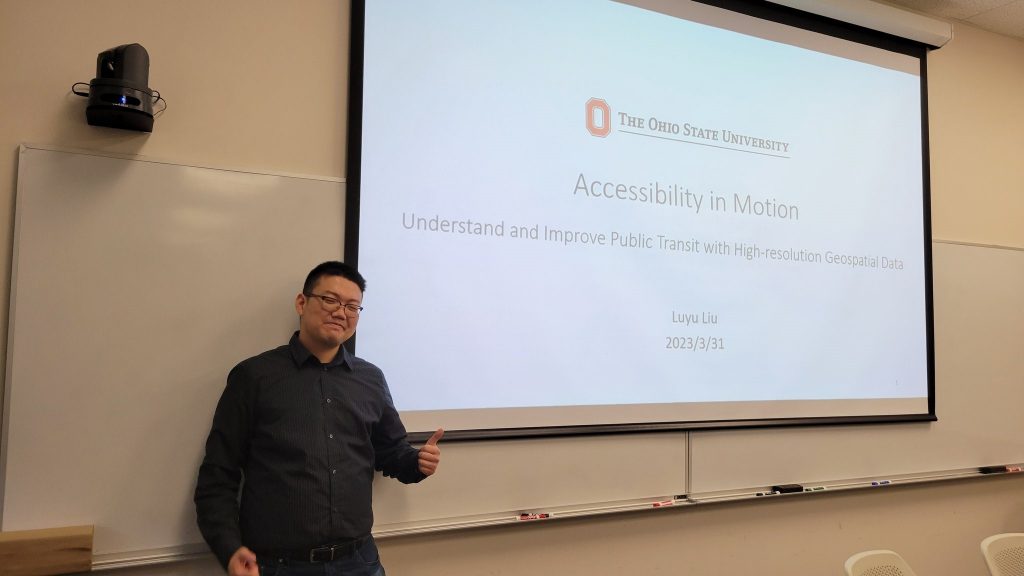By: Ines Aviles-Spadoni, M.S.

Transportation research is truly interdisciplinary. It involves a variety of factors that when pieced together shape an efficient and sustainable way of moving people and goods.
From important infrastructure to the ever evolving landscape of conventional and autonomous/connected vehicles to the influences of pedestrians, bicyclists, e-scooters, human behavior, policy, economics, and the environment, transportation integrates expertise from a variety of fields.
Dr. Luyu Liu understands this. His academic training draws from various scientific disciplines. His bachelor’s degree was in environmental sciences. His focus on transportation, however, is rooted in a passion for addressing climate change and promoting social equity.
“After I got my degree in environmental science and math, I was deeply concerned about the grave impact of climate change and the future of the planet, so I really wanted to be a scientist who could genuinely make a difference,” he said.
Dr. Liu is a geospatial data scientist with a doctoral degree in geographic information sciences from the Ohio State University. He is a new postdoctoral associate in the UFTI working with Dr. Xiang ‘Jacob’ Yan and Dr. Xilei Zhao, both faculty members in the Department of Civil Engineering in the Engineering School of Sustainable Infrastructure at the University of Florida.
So why transportation? Dr. Liu says the transportation sector is the largest source of greenhouse gasses. This presents him with the opportunity to work to reduce carbon emissions and to develop sustainable solutions. He has been actively working on research that promotes public transit and micromobility solutions to combat climate change (see paper).
While his current work at the UFTI does not directly relate to reducing carbon emissions, it does revolve around transit-oriented communities and the travel behavior of hurricane evacuees. For example, one of the projects that he is working on is related to the extreme heat exposure that transit riders experience and its social equity implications. The project involves developing and evaluating heat exposure indices for current and future climate scenarios. He is also working on the travel behavior of evacuees who used various transportation modes, such as private vehicles and public transit, during Hurricane Ian. Both projects focus on the ever-present need to address the impacts of climate change on the most vulnerable, including critical infrastructure.
However, this is not the first time that Dr. Liu has conducted work on equity issues in transportation. Before his work at UFTI, Dr. Liu studied the ridership changes in 113 U.S. public transit systems during the COVID-19 pandemic. He wanted to know its impacts on ridership. In that study, he found that in cities with more essential workers, more African Americans, females, and seniors experienced a smaller decline in demand or usage. His work revealed significant issues in transit usage during the pandemic.
“I found that wheelchair users experienced more decline in accessibility but disproportionately less decline in ridership during the pandemic,” Liu said. “This reveals a tension between accessibility and transit dependence, a substantial injustice for people with mobility disabilities.”
The real-world nature of Dr. Liu’s research is palpable. For example, he collaborated with Central Ohio Transit Authority (COTA), the transit authority in Columbus, and Transit Alliance, a non-profit based in Miami, on bus fleet on-time performance measurement. Findings from those studies have provided practical insights for their planning and operations. In fact, the Mid-Ohio Regional Planning Commission, the transportation planning office in Ohio, awarded Dr. Liu and his team the Collaborative Achievement in Sustainability Award for their efforts in mapping the progress of sustainability goals in local communities.
Dr. Liu’s research on the COVID-19 pandemic and disabilities has also drawn media attention. His work was featured in reddit.com’s r/science section, in zmescience.com and on studyfinds.org.
As for his plans after he completes his post-doctoral work at UFTI, Dr. Liu plans to stay in academia and secure a tenure-track position in sustainable transportation or geographic information science.
“I am on the job market this year,” he said. “The long-term goal is to continue the good work, generate more knowledge, and ultimately improve the quality of life and social equity.”